EHRI-3 General Partner Meeting | "Interconnectedness"
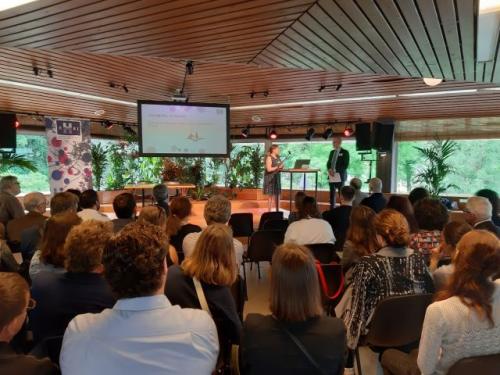
EHRI-3 General Partner Meeting, Amsterdam, 8 June 2022
For the first time since the start of the EHRI-3 project in late 2020, the annual General Partner Meeting (GPM) was held in person, on June 8-9 in Amsterdam. Over fifty people from all over Europe, Israel and the USA, representing most of the 27 partner institutions, gathered to discuss the state and progress of the 4-year EHRI-3 project. At the start of an EU funded project such as EHRI, work is divided into packages and amongst teams, and tasks and goals are firmly set. Around mid-term is a good moment to evaluate the progress.
The talks already started when participants found each other on the same ferry boat that brought them to the venue, Tolhuistuin, in Amsterdam, where the GPM took place.
Martijn Eickhoff
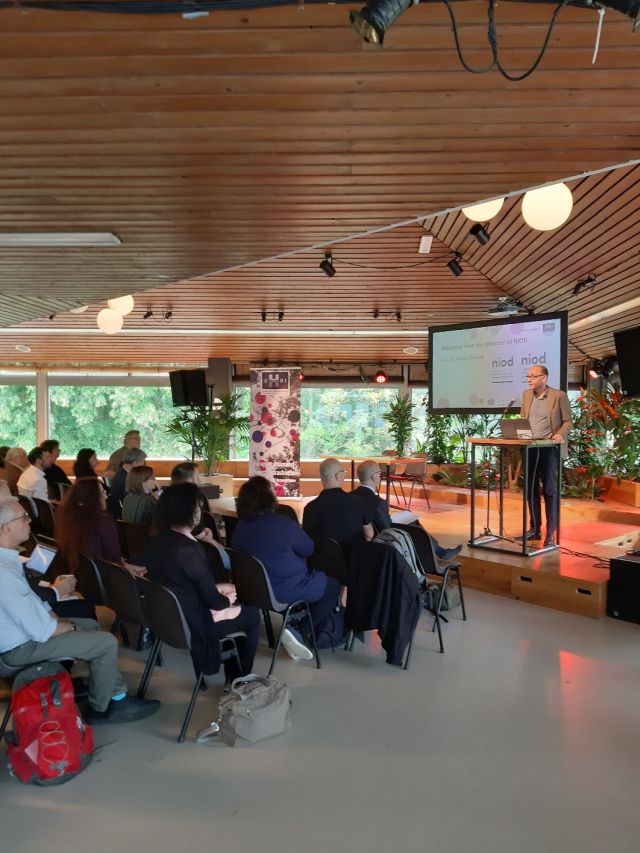 In the spacious conference room, Karel Berkhoff, co-Director of EHRI and Martijn Eickhoff, Director of coordinating partner NIOD Institute for War, Holocaust and Genocide Studies, started the meeting. Martijn welcomed the participants to Amsterdam, a city with many monuments commemorating the Second World War. Memorial sites are still being created, such as the Stolpersteine now appearing all over Amsterdam and the National Holocaust Names Memorial, revealed in 2021. Martijn mentioned the importance of the creation of EHRI-ERIC, the permanent organisation prepared in the EHRI-PP project, in conjunction with the continuous work done in EHRI-3. Holocaust research is still relevant in the battle against denial, distortion and antisemitism, Martijn underlined, as we see today, how history can become a tool misused for political reasons.
In the spacious conference room, Karel Berkhoff, co-Director of EHRI and Martijn Eickhoff, Director of coordinating partner NIOD Institute for War, Holocaust and Genocide Studies, started the meeting. Martijn welcomed the participants to Amsterdam, a city with many monuments commemorating the Second World War. Memorial sites are still being created, such as the Stolpersteine now appearing all over Amsterdam and the National Holocaust Names Memorial, revealed in 2021. Martijn mentioned the importance of the creation of EHRI-ERIC, the permanent organisation prepared in the EHRI-PP project, in conjunction with the continuous work done in EHRI-3. Holocaust research is still relevant in the battle against denial, distortion and antisemitism, Martijn underlined, as we see today, how history can become a tool misused for political reasons.
Sofia Dyak
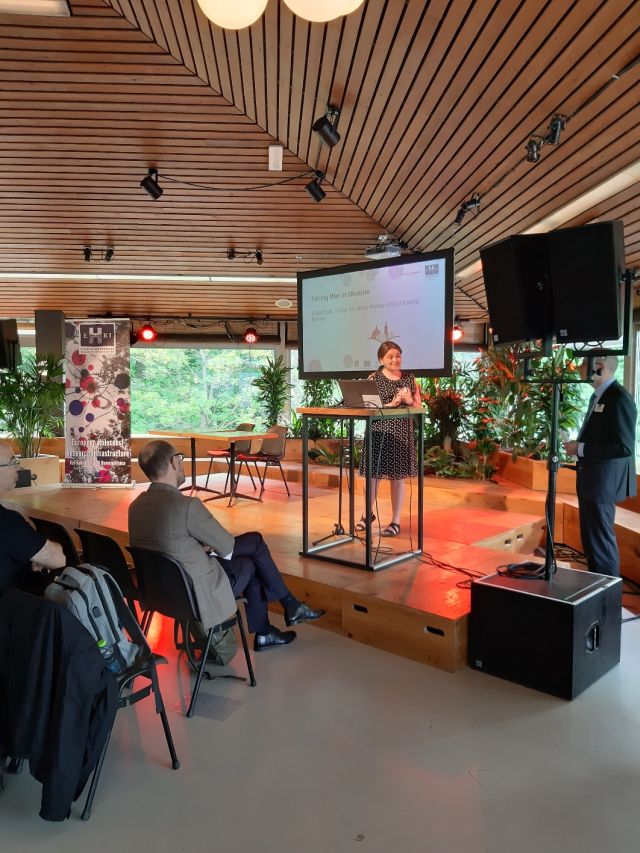 The first guest speaker of the meeting was Sofia Dyak, Director of EHRI’s partner institute in Lviv, Ukraine, the Center for Urban History of East Central Europe (CUH). She told the audience what the situation is like for her and the institute. Lviv is relatively safe but the stories that are coming through from other parts of Ukraine have an emotional affect. The future is very uncertain as no one knows how long this war will last. The Center for Urban History is also involved in housing refugees, for example in a conference room and the cellars can be used as bomb shelters. Sofia highlighted that it helps to be part of an international community that openly provides support. Ukrainian researchers are aided with a non-residential fellowship programme that was set up with foreign sponsors. Ten fellows have so far been accepted and EHRI has offered to assist with these fellowships.
The first guest speaker of the meeting was Sofia Dyak, Director of EHRI’s partner institute in Lviv, Ukraine, the Center for Urban History of East Central Europe (CUH). She told the audience what the situation is like for her and the institute. Lviv is relatively safe but the stories that are coming through from other parts of Ukraine have an emotional affect. The future is very uncertain as no one knows how long this war will last. The Center for Urban History is also involved in housing refugees, for example in a conference room and the cellars can be used as bomb shelters. Sofia highlighted that it helps to be part of an international community that openly provides support. Ukrainian researchers are aided with a non-residential fellowship programme that was set up with foreign sponsors. Ten fellows have so far been accepted and EHRI has offered to assist with these fellowships.
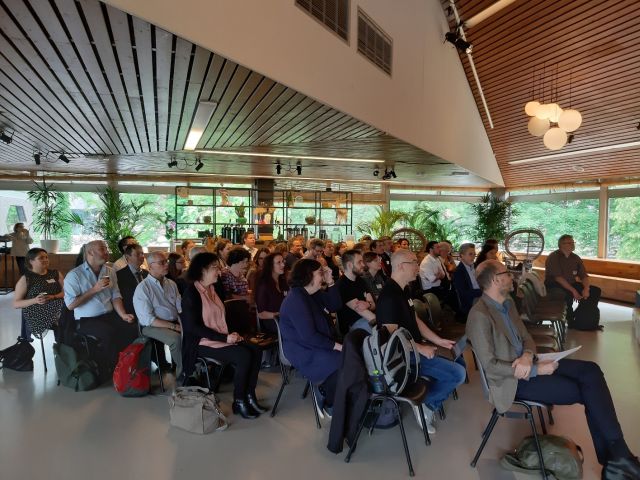 Another problem caused by the war, less pressing than those of the safety of people, but nonetheless important, is the threat it poses to collections and records, for example due to the bombing of archives. In spite of all the adversity, Ukrainians inside and outside Ukraine are working hard to ensure archival records are saved. Sofia adds that the first focus is on how to create digital back-ups and she stressed the importance of thinking about what can be done from the perspective of historians. For instance, Ukrainians are asked to share diaries or oral testimonies and refugees in Lviv are interviewed. It is important to gather information now, for these sources will determine how this war will be written about and remembered . Sofia reiterated the importance of being part of a network, such as EHRI.
Another problem caused by the war, less pressing than those of the safety of people, but nonetheless important, is the threat it poses to collections and records, for example due to the bombing of archives. In spite of all the adversity, Ukrainians inside and outside Ukraine are working hard to ensure archival records are saved. Sofia adds that the first focus is on how to create digital back-ups and she stressed the importance of thinking about what can be done from the perspective of historians. For instance, Ukrainians are asked to share diaries or oral testimonies and refugees in Lviv are interviewed. It is important to gather information now, for these sources will determine how this war will be written about and remembered . Sofia reiterated the importance of being part of a network, such as EHRI.
EHRI-3’s Progress Overall
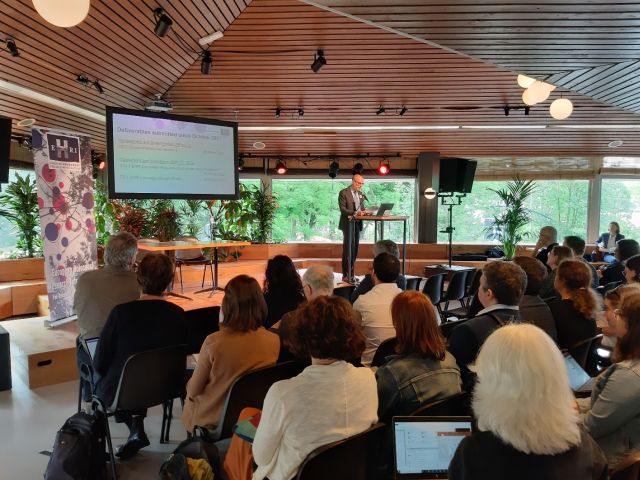 Karel Berkhoff noted that the lack of in-person meetings inevitably posed obstacles to the project’s synergies as well as the integration of new partners, but that still overall the consortium functioned well and produced very good results. He mentioned the close collaboration with the EHRI-PP project, and concluded by mentioning International Archives Day, June 9, notable for the appearance of the first-ever joint op-ed of EHRI and IHRA, focusing on what archivists can do to strengthen the field.
Karel Berkhoff noted that the lack of in-person meetings inevitably posed obstacles to the project’s synergies as well as the integration of new partners, but that still overall the consortium functioned well and produced very good results. He mentioned the close collaboration with the EHRI-PP project, and concluded by mentioning International Archives Day, June 9, notable for the appearance of the first-ever joint op-ed of EHRI and IHRA, focusing on what archivists can do to strengthen the field.
Connections and Innovations
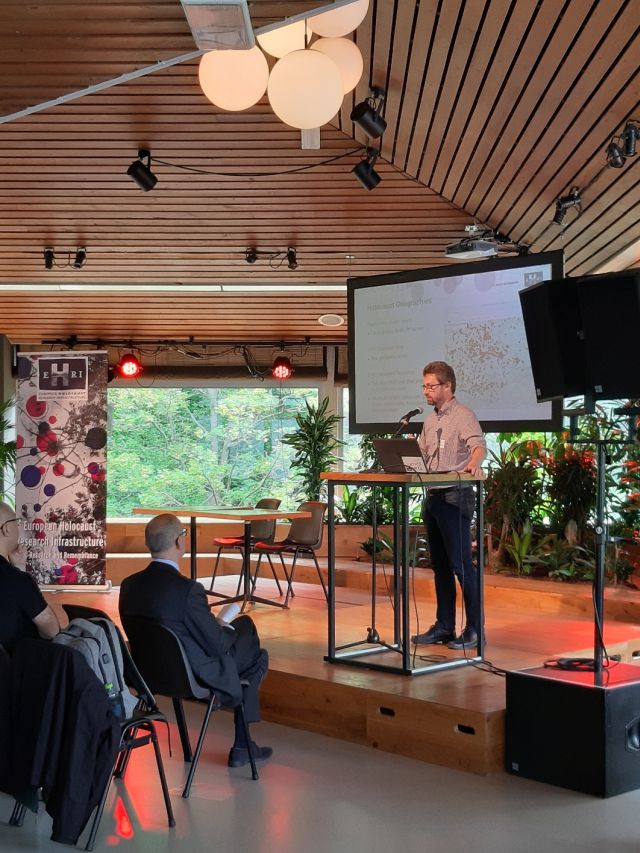 Both impressed and moved by the messages from Sofia Dyak and encouraged to continue EHRI’s work, the meeting started with presentations of recent achievements and plans for the future. Michal Frankl presented Work Package 10 (see an overview of all EHRI Work Packages) that deals with “Thematic Layers across Collections”, detailing how new approaches are developed while activities and services that were initiated during the EHRI-2 project, such as the EHRI Document Blog and the Online Editions are continued. A work in progress is the EHRI Dashboard, which will facilitate searching for EHRI related data in one location and the creation of thematic perspectives on EHRI data.
Both impressed and moved by the messages from Sofia Dyak and encouraged to continue EHRI’s work, the meeting started with presentations of recent achievements and plans for the future. Michal Frankl presented Work Package 10 (see an overview of all EHRI Work Packages) that deals with “Thematic Layers across Collections”, detailing how new approaches are developed while activities and services that were initiated during the EHRI-2 project, such as the EHRI Document Blog and the Online Editions are continued. A work in progress is the EHRI Dashboard, which will facilitate searching for EHRI related data in one location and the creation of thematic perspectives on EHRI data. 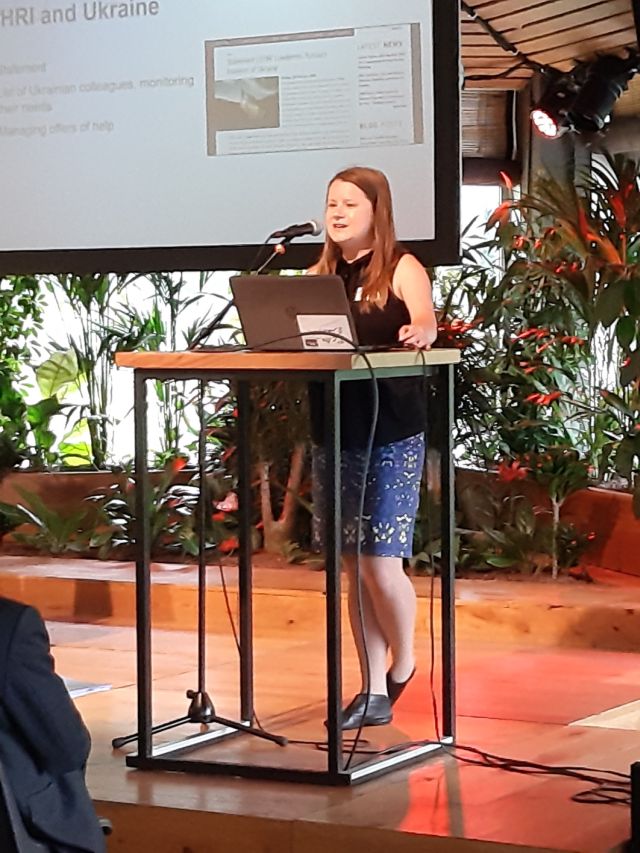 Michala Lônčíková then talked specifically about what Work Package 10 has done regarding trying to help Ukraine and how sharing of information is very important. Several blog posts and webinars, of which some relating to Ukraine, are under development.
Michala Lônčíková then talked specifically about what Work Package 10 has done regarding trying to help Ukraine and how sharing of information is very important. Several blog posts and webinars, of which some relating to Ukraine, are under development.
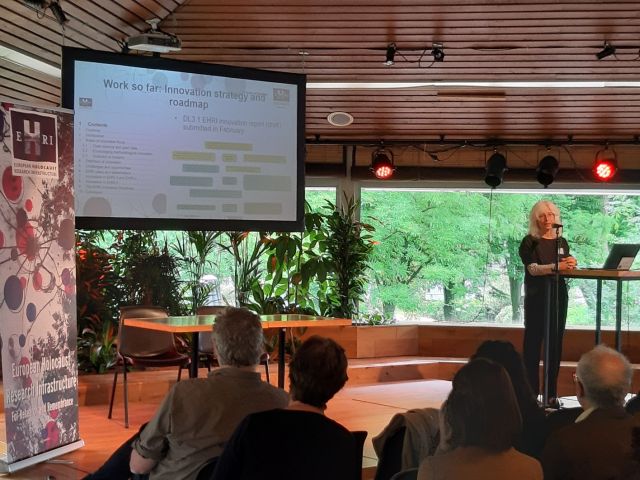 Katharina Freise was up next with her Work Package on Impact, Innovation and Sustainability. The meaning of the term innovation (a significant change in the way things are done) in the context of EHRI is a very important topic of discussion. Structured frequent internal discussions with a focus on what members are currently doing and where they see their work go in the future, along with planning on how EHRI can collaborate with other research infrastructures is continuing to increase EHRI’s societal and cultural impact. A practical outcome is the advanced creation of a podcast series, called For the Dead and for the Living. Traces of the Holocaust, which will be launched in Autumn 2022.
Katharina Freise was up next with her Work Package on Impact, Innovation and Sustainability. The meaning of the term innovation (a significant change in the way things are done) in the context of EHRI is a very important topic of discussion. Structured frequent internal discussions with a focus on what members are currently doing and where they see their work go in the future, along with planning on how EHRI can collaborate with other research infrastructures is continuing to increase EHRI’s societal and cultural impact. A practical outcome is the advanced creation of a podcast series, called For the Dead and for the Living. Traces of the Holocaust, which will be launched in Autumn 2022.
The EHRI Labs - Connecting Expertise and Archives
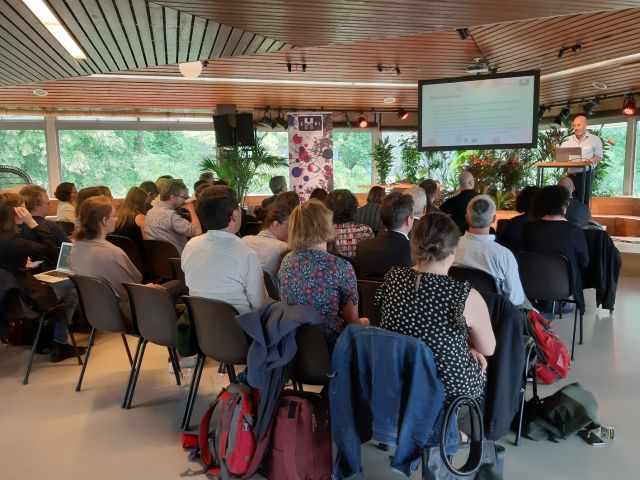 The Work Packages that are structured around the creation of the EHRI Labs talked about the difficulties they experienced because of the pandemic and lockdowns. Giora Zwilling of Work Package 11, Connecting Micro-Archival Communities, related how the impossibility of having in person meetings made it much harder to locate and engage smaller archives.
The Work Packages that are structured around the creation of the EHRI Labs talked about the difficulties they experienced because of the pandemic and lockdowns. Giora Zwilling of Work Package 11, Connecting Micro-Archival Communities, related how the impossibility of having in person meetings made it much harder to locate and engage smaller archives.
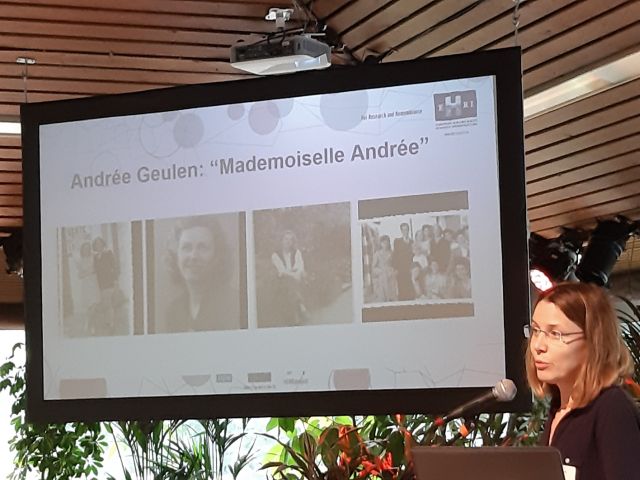 Veerle Vanden Daelen started the Work Package 9 (Data Identification and Integration) presentation by commemorating Andrée Geulen, a Belgian woman who saved hundreds of Jewish children during the war. Andrée sadly died on 31 May 2022, aged 100 years, but her story is safeguarded in many sources, including those integrated in the EHRI Portal.
Veerle Vanden Daelen started the Work Package 9 (Data Identification and Integration) presentation by commemorating Andrée Geulen, a Belgian woman who saved hundreds of Jewish children during the war. Andrée sadly died on 31 May 2022, aged 100 years, but her story is safeguarded in many sources, including those integrated in the EHRI Portal.
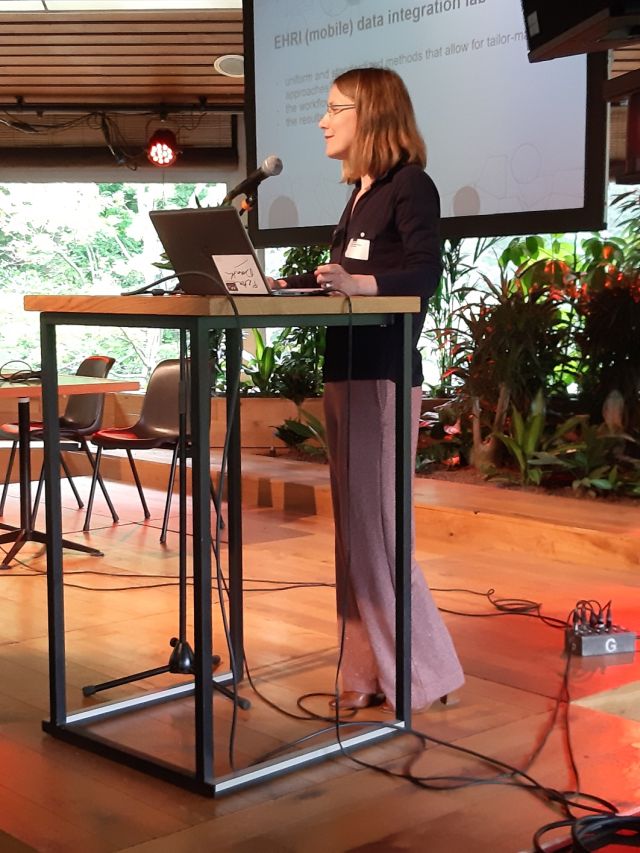 Veerle mentioned that the inability to have in-person meetings has been a hindrance for data integration. The mobile data integration lab has been restructured due to the pandemic, Nevertheless, despite the delayed start, results are promising. New country reports are being researched, 72 more institutions have been added to the EHRI Portal, and existing collections have been updated.
Veerle mentioned that the inability to have in-person meetings has been a hindrance for data integration. The mobile data integration lab has been restructured due to the pandemic, Nevertheless, despite the delayed start, results are promising. New country reports are being researched, 72 more institutions have been added to the EHRI Portal, and existing collections have been updated.
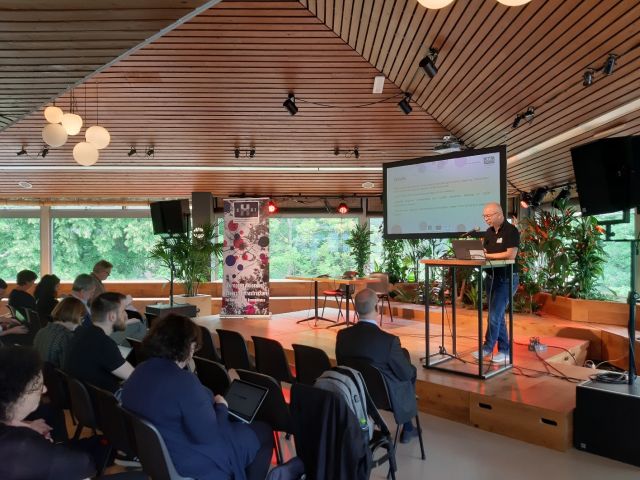 Another Work Package that will benefit from fewer COVID 19-restrictions is Work Package 4, Localisation and Capacity Building, presented by Angel Chorapchiev. Two groups of experts have been created: The Reference and Information Services Expert Group and the Holocaust Photographs Expert Group. Both groups consist of people outside EHRI as well as from EHRI partner institutions. COVID-19 permitting, the Photographs Expert Group will have its first in-person meeting in December 2022. The Reference and Information Services Expert Group could follow in (early) 2023. The topics discussed by these groups will be suggested by their participants.
Another Work Package that will benefit from fewer COVID 19-restrictions is Work Package 4, Localisation and Capacity Building, presented by Angel Chorapchiev. Two groups of experts have been created: The Reference and Information Services Expert Group and the Holocaust Photographs Expert Group. Both groups consist of people outside EHRI as well as from EHRI partner institutions. COVID-19 permitting, the Photographs Expert Group will have its first in-person meeting in December 2022. The Reference and Information Services Expert Group could follow in (early) 2023. The topics discussed by these groups will be suggested by their participants.
Access, Training and Education Services
The importance of connecting, interconnectedness and, in human form, networking has been mentioned in many surveys that were conducted by EHRI among users, researchers and organisations. EHRI 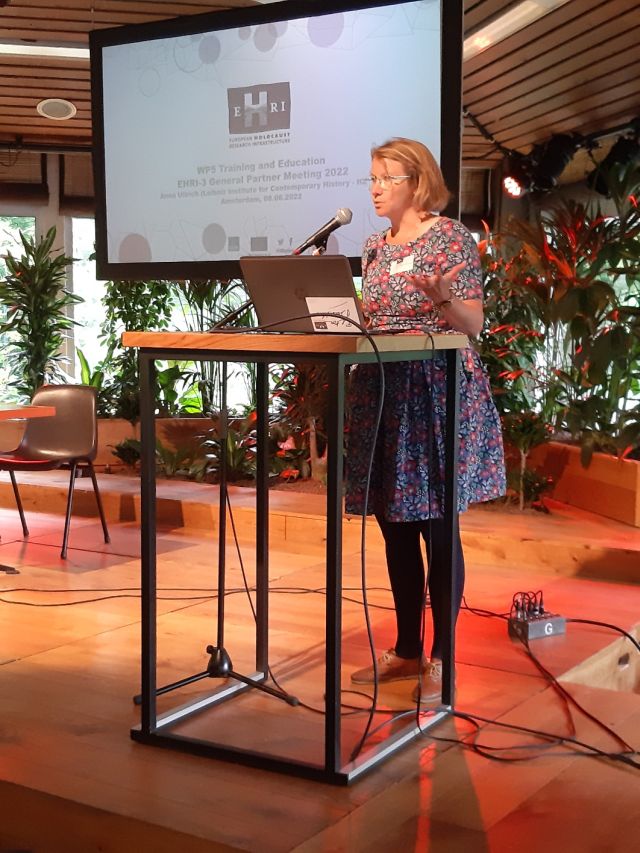 Seminars have always been excellent for networking and, when in person, stimulate a group dynamic. The Center for Urban History in Ukraine will host an EHRI online seminar for which participants have already been selected. Given the current situation, dates are yet uncertain. Another seminar, on engaging educators, is planned. Anna Ullrich of Work Package 5, Training and Education, concluded by mentioning the MOOC (Massive Open Online Course), which is under development and will be based on the interactive online course created in EHRI-2.
Seminars have always been excellent for networking and, when in person, stimulate a group dynamic. The Center for Urban History in Ukraine will host an EHRI online seminar for which participants have already been selected. Given the current situation, dates are yet uncertain. Another seminar, on engaging educators, is planned. Anna Ullrich of Work Package 5, Training and Education, concluded by mentioning the MOOC (Massive Open Online Course), which is under development and will be based on the interactive online course created in EHRI-2.
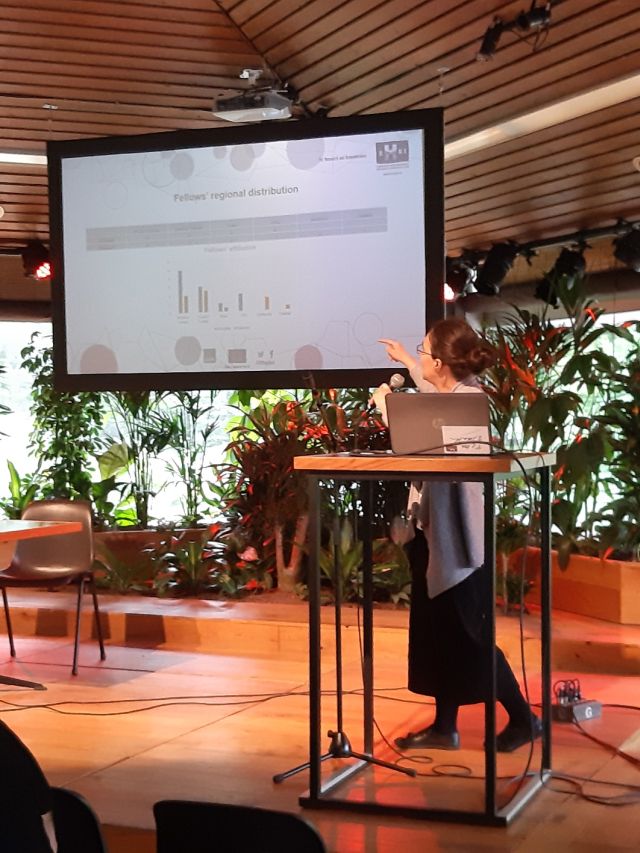 Ana Barbulescu presented the Fellowships Work Package (WP 6 Coordination of Trans-National Access), which has most certainly been affected by the pandemic. Between the first (January 2021) and second Conny Kristel Fellowship Call (January 2022) a downfall in applications was noticeable. Though there were fewer applicants during the second call, more partner institutions will host EHRI Conny Kristel fellows. With the hope that traveling will become easier and easier, a third call will be published in July this year. The first thematic workshop for EHRI Conny Kristel Fellows is planned for December 2022.
Ana Barbulescu presented the Fellowships Work Package (WP 6 Coordination of Trans-National Access), which has most certainly been affected by the pandemic. Between the first (January 2021) and second Conny Kristel Fellowship Call (January 2022) a downfall in applications was noticeable. Though there were fewer applicants during the second call, more partner institutions will host EHRI Conny Kristel fellows. With the hope that traveling will become easier and easier, a third call will be published in July this year. The first thematic workshop for EHRI Conny Kristel Fellows is planned for December 2022.
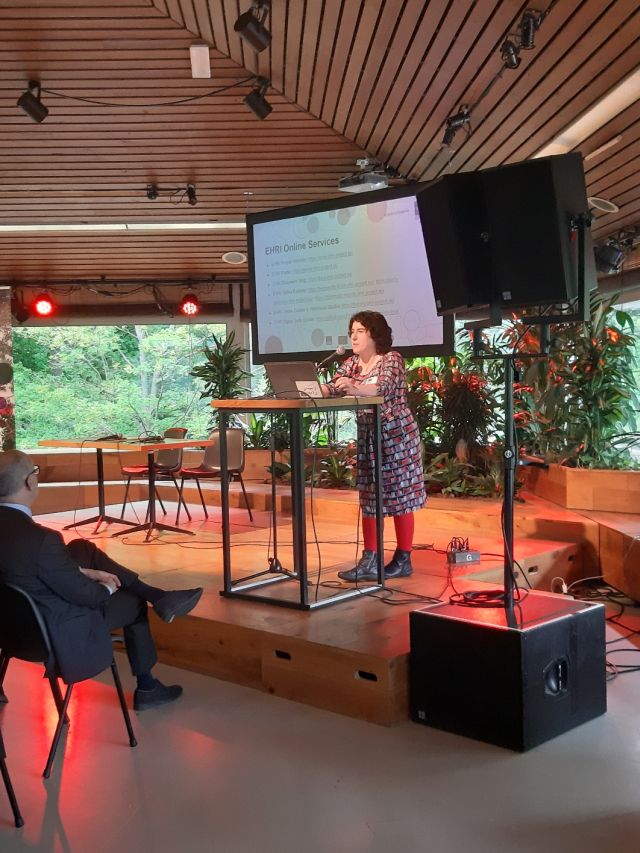 Rachel Pistol (Work Package 2, Dissemination, and 7, Virtual Access) concluded the presentations with optimistic news that the number of users of EHRI services, such as the EHRI Portal, is still growing. However, there is always room for improvement, so an International Advisory Panel has been established to delve into questions like “How can EHRI encourage that usage of the Portal leads to usage of the Document Blog as well?”. Here too, “Interconnected” (of content) seemed to be the key word.
Rachel Pistol (Work Package 2, Dissemination, and 7, Virtual Access) concluded the presentations with optimistic news that the number of users of EHRI services, such as the EHRI Portal, is still growing. However, there is always room for improvement, so an International Advisory Panel has been established to delve into questions like “How can EHRI encourage that usage of the Portal leads to usage of the Document Blog as well?”. Here too, “Interconnected” (of content) seemed to be the key word.
After the plenary session of the General Partner Meeting, separate Work Package meetings were held, as well as a social dinner, which improved even further the interconnectedness. EHRI-3 is in good shape and can look forward to a stable and fruitful future.
